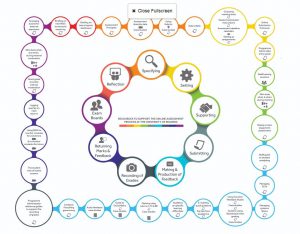Emma Mayhew, Academic Director, EMA Programme e.a.mayhew@reading.ac.uk
Geoff Taggart, Academic Partner, EMA Programme and Associate Professor, Institute of Education g.taggart@reading.ac.uk
Michelle Reid, Study Advisor, The Library michelle.reid@reading.ac.uk
When the EMA Programme ran a staff survey earlier this year, we were really interested to see the response to the use of the QuickMark function on Turnitin Grademark. We asked 47 colleagues from the Institute of Education, the School of Agriculture, Policy and Development and the School of Archaeology, Geography and Environment Science what they considered the most important benefits of online assessment to be. 28 identified the use and reuse of QuickMarks, more than any other potential benefit. Colleagues highlighted how the use of QuickMarks could save marking time, could lead to clearer feedback, and could trigger broader conversations around marking criteria. In addition to this, a focus group carried out at the IoE in 2018 showed that students particularly appreciated the use of Quickmarks when they were used to provide specific examples of errors described more generally in the rubric and narrative comments. More recently, an EMA Programme evaluation exploring student responses to online submission, feedback and grading found that, out of 314 responders, 78% said that it would be useful if in-text or QuickMark comments could include a link to a Study Advice resource.
These responses fed into some thinking that the Programme team had already been doing around QuickMarks, particularly surrounding how we might gain the maximum benefit from this feature in terms of student engagement, learning and feedforward.
We were aware that some colleagues within the Institute of Education had worked together to develop a set of shareable, discipline specific comments. We wondered whether we could draw on this idea to develop a set of shareable, institution specific QuickMarks to help save marking time and enhance the quality of feedback but which would also appeal to colleagues in all disciplinary areas.
This thinking led us to create a small project group made up of Emma Mayhew (EMA Programme), Geoff Taggart (EMA Programme), Michelle Reid and Erika Delbecque (Study Advice). We worked together, and liaised with colleagues, to create a set of 21 commonly used comments.
But we wanted to go a little further than this. We were also really cognisant of the need to support feedforward and, to do this, we decided to include a hyperlink at the end of each shareable QuickMark comment to direct students to sources of support created by the Study Advice team and wider Library resources.
As an example, if a marker believes that a student has included an inappropriate source for an academic piece of writing, they might like to use the following shareable QuickMark:
This is not an appropriate source for an academic piece of work. Evaluate your sources whether they are books, journals, websites or other texts, and consider whether they are suitable to support the point that you are making. For more advice, see this guide from the Library: https://www.reading.ac.uk/lib-literature-searching.aspx
In this way, the new QuickMark sets underline the role that students have in their own self-learning and also highlights the range of existing supporting video and written material available to enhance student assessment literacy.
We divided the QuickMarks into categories-referencing, structure, style and critical analysis-and invited colleagues to download one or more of the categories, pulling them into their own QuickMark libraries which are available to them each time they mark. The new QuickMark comments can be used as they are but we would also encourage colleagues to edit the QuickMarks, keeping the hyperlink, but amending the text to add further discipline-specific context, or adding text to reflect feedback for an individual student.
We have housed these QuickMarks on the EMA online resource map which provides direct links for academic colleagues and professional staff to key university resources ordered around the Assessment and Feedback lifecycle. The QuickMark sets can be found in the light blue ‘marking’ section. They can also be found directly on the EMA Programme site.

The EMA Programme Resource Map
Available at https://sites.reading.ac.uk/ema/resource-map/
To support their use, we created a 90 second screencast to show colleagues how to download the comments and amend the QuickMarks. Click on the image below to view this.
We have disseminated this resource through the T&L community within the University and also through the TEL Practitioner Forum. After only six weeks, we counted 194 views of the QuickMarks site and, in total, 413 QuickMark comments were downloaded by colleagues. The set focused on essay writing structure has been the most popular with 29 downloads of the whole set.
The response from colleagues so far has been very positive. Comments include:
‘Because I haven’t used QuickMarks before and was not sure of what they might be used for, the generic QuickMark sets gave me a good starting point.’
‘I like the way you can tweak them to fit into your own assessment criteria and group them into your own personalised set.’
We hope that these institution specific QuickMarks sets will be a useful additional tool for colleagues. If you do have any questions about these sets and how to use them or if you would like to provide further feedback, please don’t hesitate to contact us.



 This is an ongoing project to devise and implement a framework of skills to be developed by undergraduate students in Food and Nutritional Sciences throughout their degree programme. I have worked closely with staff in the Department on this project and so far it has resulted in changes to module content and a redevelopment of the departmental personal tutorials system.
This is an ongoing project to devise and implement a framework of skills to be developed by undergraduate students in Food and Nutritional Sciences throughout their degree programme. I have worked closely with staff in the Department on this project and so far it has resulted in changes to module content and a redevelopment of the departmental personal tutorials system.


